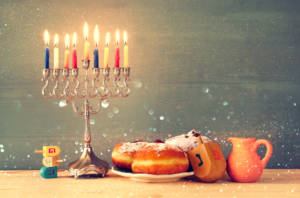
What is Hanukkah, and how did it develop into the celebration we know today? Uncovering its roots reveals a fascinating narrative from ancient times.
Many cultures and religions have a “festival of lights.” Hindus all over the world light lamps, asking Lakshmi for wealth and wisdom during their fall Diwali celebrations. Every Chinese year ends with a Lantern Festival, heralding the coming spring and new year. The Jewish holiday Hanukkah is also called a festival of lights, but there’s much more to it than that. What is Hanukkah, and how did it develop into the celebration we know today? Discovering its roots reveals a fascinating narrative from ancient times.
The Maccabean Revolt
ReformJudaism.org discusses the events behind the Hanukkah story. Antiochus IV Epiphanes was a Greek Seleucid king during the middle of the 2nd century BCE. The Seleucid Empire stretched from western India to modern-day Israel. The Encyclopedia Britannica explains that Antiochus wanted to strengthen Hellenistic cultural influences throughout the region. To solidify power, he appointed Menelaus as Jerusalem’s high priest. The former high priest, Jason, led a revolt against Menelaus and his supporters.
In retaliation, Antiochus invaded Jerusalem and enforced Hellenism. Jewish religious practices were officially forbidden and punishable by death. Antiochus erected an altar to Zeus in the Temple and ordered sacrifices performed in front of an idol in his likeness. These events spurred Judah Maccabeus, a member of a prominent priestly family, to lead a revolt and reclaim the Temple.
Yet Haaretz shares an alternative explanation for the Maccabean revolt. Historians suggest that it was a civil war in Judea, pitting Hellenist Jewish people against traditionalists. Antiochus sent multiple armies to put down the rebellion but was foiled each time. With an attack by King Mithridates I of Parthia in 167 BCE., Antiochus was forced to defend his empire. This allowed the Maccabean rebels to retake Jerusalem and the Temple in 164 BCE.
A Miracle in Jerusalem’s Temple
Curiously, the event that’s central to the Hanukkah holiday doesn’t even appear in I or II Maccabees. The Talmud tells the tale, mentioning that Judah Maccabees’ forces found only one jar of oil left when they reclaimed the Temple. That jar should have only lasted one day, but the Temple’s eternal light burned for eight days while a messenger traveled in search of more oil. These eight days of light are encapsulated in Hanukah’s eight days along with its menorah, a nine-branched candelabra that holds the candles that are lit throughout the celebration.
A Festival of Lights
Hanukkah’s date shifts every year because the Hebrew calendar uses lunar months. The holiday always begins on the 25th day of Kislev, which can fall between early November and late December. Every night during this holiday, one candle is added to the menorah and lit by a servant candle called a shamash. The first candle is placed on the right side, and successive candles are added, moving from right to left. Chabad explains that these lights burn after sunset to bring light into the darkness. Blessings are said while the candles are ignited and to commemorate the Hanukkah miracle.
The lights symbolize the Temple miracle, but fried foods also recall the long-lasting supply of lamp oil. My Jewish Learning mentions that Ashkenazi Jewish people typically fry and serve potato cakes called latkes, while Sephardic Jewish people fry and serve doughnuts. Other central Hanukkah traditions include giving gifts and playing with dreidels, spinning tops emblazoned with four Hebrew letters: nun, gimmel, hay, and shin. The dreidel’s four letters stand for the phrase “Nes gadol hayah sham,” which translates to “a great miracle happened there.”
A Holiday of Hope
Like many modern holidays, Hanukkah is a commemoration. Its story focuses on resistance against authoritarianism and religious oppression. The history behind the Maccabean revolt may not yet be clear, but Hanukkah remains symbolic of survival, persistence, and hope.


